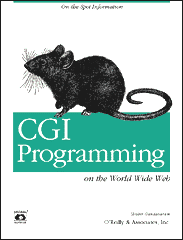
CGI Programming on the World Wide Web
By Shishir Gundavaram1st Edition March 1996
This book is out of print, but it has been made available online through the O'Reilly Open Books Project.
|
|
|

|
CGI Programming on the World Wide WebBy Shishir Gundavaram1st Edition March 1996 This book is out of print, but it has been made available online through the O'Reilly Open Books Project. |
10.2 What Are Sockets?
Most companies these days have a telephone switchboard that acts as a gateway for calls coming in and going out. A socket can be likened to a telephone switchboard. If you want to connect to a remote host, you need to first create a socket through which the communications occur. This is similar to dialing "9" to go through the switchboard to the outside world.
Similarly, if you want to create a server that accepts connections from remote (or local) hosts, you need to set up a socket that "listens" periodically for connections. The socket is identified on the Internet by the host's IP address and the "port" that it listens on. Once a connection is established, a new socket is created to handle this connection, so that the original socket can go back and listen for more connections. The switchboard works in the same manner: as it handles outside phone calls, it routes them to the appropriate extension and goes back to accept more calls.
Back to: CGI Programming on the World Wide Web
© 1999, O'Reilly & Associates, Inc.